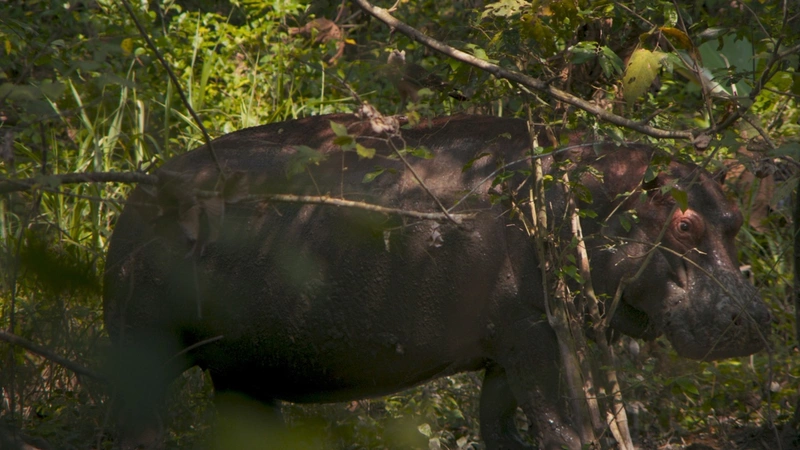Nelson Carlo De Los Santos Arias’ Pepe is staggeringly overstuffed with ideas, conceits, and detours. It has the veneer of a grounding element, peculiar as it is, but spills far out and beyond into a bush of jostling directions. Arias is the kind of storyteller who doesn’t like settling down into a certain determining path, always in the mood for shaking it all up and taking strange, startling turns that might not fully cohere but nevertheless contain in them a spirit of such pure, defiant experimentation it’s frequently intriguing. The nature and accent of his telling are suffused with surprise as he takes us on a ride packed with unusual daring, freshness, and a surge of untameable energy.
“Pepe” is an unpredictable film not on account of cheapening tricks designed just for a seducing display but because it is buoyed by a thrust to continually explore, wander freely, and ramble beyond stratified denominations of form and style. Consider the central pinning gambit of the film. A hippo speaks to us from his afterlife. Pepe was one of the many animals brought over to Pablo Escobar’s estate. Hailing from Namibia, the hippo escaped the confines after Escobar’s death. The drug lord’s passing opens the film.
The sequence is discombobulating, merging archival sights with electronic sounds and a dizzying play of light. This almost seems to be a way of bracing us for the consistently upturning experiences that watching the film is stacked with. The hippo is spoken by various actors, shifting across languages. The electronically accentuated snorting sound manages to disorient every time it rings out across the expanse.
After he fled, Pepe made the Magdalena River his home of roaming and rest. But it’s not just his own experience and life that wholly dominates the film. Arias is also interested in the local human tangle of affairs. A tour guide encourages a local resource to tell foreign travelers about the hippos popular in the region. He tells how the hippos warn of evil but is promptly shut down by the guide when he starts hinting at the danger the creatures pose.

The guide derides the tales as African fables and products of “great imagination” that must not be taken seriously. The film keeps shuttling between Pepe’s own accounts and the lives of the fishermen, whose lives are intricately interlinked with his. Pepe never quite got over his elder brother’s ruthless takeover of power and leadership of the herd from the reins of his father, following which he was cast out. The grudge he held against his brother is evident in the tone.
Pepe toggles to black-and-white sections fleetingly every now and then before leaping back into color. The aspect ratio also fluctuates. The impulse to reject stability of any sort is particularly strong and impressive in the film, even if not all portions necessarily land or have equal impact. The domestic turbulence of the fisherman, Candelario (Jorge Puntillon Garcia), feels especially listless. The wife isn’t convinced of his story about the terror the hippo gives him, dismissing it as cock-and-bull.
Witnessing the chaos and frustration of this strained marriage is a plodding prospect, though it strikes authentic chords. A segue rolls into a pageant competition, with the contesting girls sharing their dreams for the region. Hope for the region, full of a battered history, gleams. Perhaps this is the snatch of solace, and affirmation Pepe advances amidst a hybrid saga that is drenched in despair and headed for tragedy. The climactic bits, which cursorily dive into the outrage over Pepe’s killing, stretch the ‘infiltrator’ metaphor too bluntly; thankfully, the final shot of “Pepe” is filled with such spectacular, cutting grimness Arias bows out brilliantly.





![How to Sell Drugs Online (Fast) Netflix Original TV Series [2019] Review](https://79468c92.delivery.rocketcdn.me/wp-content/uploads/2019/06/How-to-Sell-Drugs-Online-Fast-Netflix-high-on-films-768x378.jpg)

![Tughlaq Darbar [2021] Review: A political satire told through a unique hook](https://79468c92.delivery.rocketcdn.me/wp-content/uploads/2021/09/Tughlaq-Durbar-3-768x431.jpg)
